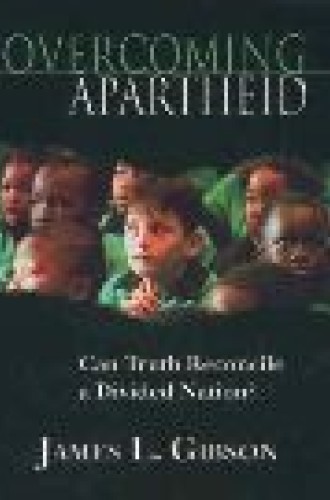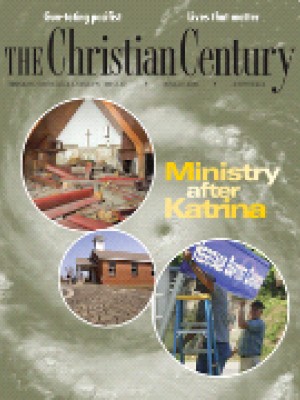Overcoming Apartheid, by James Gibson
Anyone engaged in conflict resolution, whether interpersonal or international, would agree that the process must begin with truth telling. But can truth telling be more than a beginning? Can it create a political environment hospitable to both perpetrator and victim?
Countries emerging from civil wars or other disruptive internal violence face the challenge of rebuilding their state in such a way that it will be habitable for people on different sides of the conflict as well as for those who had the misfortune of simply living in a country fraught with insecurity. States that wish to establish legitimate political institutions that will stand the test of time need to address the past in order to realize a better future. But how is this to be done?
Read our latest issue or browse back issues.
Truth commissions are meant to provide a type of transitional justice that enables a state to deal with the past and create a future in which human rights violations will be less common. Twenty-four countries, including Chile, Sierra Leone, East Timor and Haiti, have established truth commissions or commissions of inquiry in the wake of major internal conflicts.
The Truth and Reconciliation Commission established in South Africa in 1995 was not the first commission of its kind, but it is certainly the most famous. Its mandate was to bear witness to and record human rights violations committed by both the government and antiapartheid groups between 1960 and 1994, and in some cases to grant amnesty to the perpetrators. The TRC has since served as a model for other countries to follow in exorcising the demons of violence and attempting to reestablish both the legitimacy of political institutions and the attractiveness of citizenship.
The TRC had a high profile because of both the magnitude of the problem of transitional justice in South Africa and the prestige of its chair, Anglican archbishop Desmond Tutu, who, like many South Africans, was interested in seeing reconciliation accomplished by the commission. But did the commission achieve its goals? Are South Africans more reconciled today than in the past? And if so, did the truth telling lead to that reconciliation? These are the questions that James Gibson very ambitiously attempts to answer in Overcoming Apartheid.
Gibson is a social scientist who favors the most rigorous methodologies. His book is a summation of evidence from surveys he and his South African colleagues administered in 2000 and 2001. They interviewed thousands of South Africans from the four racial categories of the apartheid era: black, white, colored (mixed race) and Asian. By surveying both opinion and behavior, Gibson tested the hypothesis that truth leads to reconciliation.
Reconciliation, Gibson posits, involves at least four critical concepts: interracial reconciliation, political tolerance, support for the principles of human rights, and belief that the state is legitimate. Truth is much more difficult to define for the apartheid era. Race, personal experiences during apartheid and the political climate in South Africa at the time of the survey all affected respondents' understanding of historical events. Gibson argues that one of the clear benefits of the TRC for South Africa is that it established the common and moderate view that the antiapartheid struggle was just, though flawed, and that those defending apartheid did terrible things. "Because the TRC documented atrocities on all sides of the conflict many South Africans became less convinced about the purity of their side and were forced to acknowledge that the 'other side' might have been unfairly victimized."
Yet a common perspective on the truth of the past has not led to a common experience of reconciliation. Unquestionably the most interesting finding from the surveys was the degree of variation among groups in terms of how reconciled they felt. All of the groups exhibited some degree of reconciliation, but there was not the deep, cross-cutting result that one would hope to see. Blacks were significantly less reconciled than whites, Asians or coloreds.
For blacks in South Africa, Gibson contends, truth has not led to reconciliation, and racial isolation is a significant cause of this irreconciliation. Those reporting fewer contacts outside of work with people from other racial groups were less reconciled than others. Among blacks, four out of five reported that they had never had a meal with a white person. When Gibson examined which groups of blacks were the least reconciled, the answer was disturbing. The least reconciled among blacks were those who were frequent church attenders. Gibson is careful to note that he did not find that religious belief caused irreconciliation, but merely that those who attended church frequently were less likely to meet the criteria of "reconciled." Although Gibson never determines why this is, he suggests that perhaps religious blacks have an otherworldly understanding of reconciliation that is not linked to truth about the apartheid era.
This is a weighty book. At 467 pages including appendices, charts and tables, it is not for bedtime reading. Those looking for a summary of Gibson's work are better off searching the academic journals to which he is a frequent contributor. Yet this is an extremely important book. Gibson raises social-science questions that are compelling to Christians and others who are interested in social justice and the formation of just societies. What is an effective measure of reconciliation? How do we measure forgiveness? Why are religious people less reconciled than others in South Africa? Prospective doctoral students should take note: not only are these questions important, they are also likely to attract funding both because truth commissions are proliferating in postconflict societies and because they represent unique combinations of the spiritual and the political. Moreover, other truth commission efforts, notably those of Cambodia and Sierra Leone, have not been as successful as that of South Africa.
Overcoming Apartheid can leave its readers with a healthy skepticism about whether truth commissions lead to reconciliation. They can lead to the articulation of truth, but this truth is often controlled by politically powerful actors in society—so much so that some scholars have called the commissions an "official adjudication of memory" or have defined memory itself as a product of their work. An official memory as established by a truth commission will always be incomplete, just as any official history of a war is incomplete. Thus official truth as determined by a truth commission needs to be rigorously judged.
If the truth is to provide a foundation sufficient for the rebuilding of a society, it must be recognizable to more than one faction. In the case of South Africa, the truth that emerged from the commission was recognizable to all of the four major societal groups, but it did not bring a sense of reconciliation to all four because truth is only the start of the reconciliation process. It is a beginning that must be built upon through increased contact with the other. Without the social contact that leads to more reconciled attitudes, truth does not bear fruit.






